#devops architect certification
Explore tagged Tumblr posts
Text
How to Advance Your Career with AWS Certifications
In the fast-paced world of cloud computing, Amazon Web Services (AWS) has established itself as a leader in providing scalable, reliable, and cost-effective cloud solutions. As organizations increasingly migrate their workloads to the cloud, the demand for skilled AWS professionals has surged. If you're looking to advance your career in the IT industry, AWS certifications can be your ticket to success. We'll explore how AWS certifications can propel your career forward and provide a step-by-step guide to achieving them.
The Power of AWS Certifications
AWS certifications are widely recognized in the IT industry and are considered a valuable asset for both newcomers and seasoned professionals. Here are some key reasons why AWS certifications can supercharge your career:
1. Industry Recognition
AWS is a trusted name in cloud computing, and their certifications are well-respected by employers worldwide. Holding an AWS certification demonstrates your expertise and commitment to staying current in a rapidly evolving field.
2. Career Advancement
AWS certifications can open doors to new job opportunities and promotions. Many organizations prefer to hire certified professionals because they are seen as more capable and knowledgeable in AWS technologies.
3. Increased Earning Potential
Certified AWS professionals often command higher salaries than their non-certified counterparts. According to a survey by Global Knowledge, AWS-certified individuals earn an average salary that is significantly above the industry average.
4. Skill Validation
Obtaining an AWS certification validates your skills and knowledge in specific AWS services and technologies. It serves as concrete evidence of your expertise in the eyes of potential employers.
Choosing the Right AWS Certification
AWS offers a wide range of certifications, catering to various roles and skill levels. Before you embark on your certification journey, it's essential to choose the one that aligns with your career goals and current experience. Here are a few popular AWS certifications:
1. AWS Certified Cloud Practitioner
Designed for individuals with little or no cloud experience, this entry-level certification provides a broad overview of AWS services, cloud concepts, and basic architectural best practices.
2. AWS Certified Solutions Architect
This certification is ideal for those interested in designing distributed systems on AWS. It covers topics like architectural best practices, security, and scalability.
3. AWS Certified SysOps Administrator
Focused on system operations and management, this certification is suitable for individuals responsible for deploying, managing, and operating systems on AWS.
4. AWS Certified DevOps Engineer
For those interested in automation, this certification validates skills related to continuous delivery, automation, and managing infrastructure as code.
5. AWS Certified Security - Specialty
For security professionals, this certification focuses on securing AWS workloads and implementing advanced security measures.
Steps to AWS Certification Success
Now that you've decided on the right certification, here are the steps to help you achieve your goal:
1. Set Clear Goals
Define your career goals and how AWS certifications align with them. Having a clear vision will keep you motivated throughout your certification journey.
2. Choose Relevant Training Resources
AWS provides extensive documentation and training resources, including online courses, practice exams, and official study guides. Consider enrolling in AWS Certified training courses, which are designed to help you prepare for the exams.
3. Hands-On Experience
Practice is key to mastering AWS. Create your AWS account and experiment with the services covered in your chosen certification. Hands-on experience will deepen your understanding and boost your confidence.
4. Study and Prepare
Devote time to study and review the certification's objectives. Use study guides, practice exams, and community forums to reinforce your knowledge.
5. Take Practice Exams
Practice exams are invaluable for gauging your readiness. They help you identify areas where you need to improve and build your test-taking skills.
6. Schedule and Take the Exam
Once you feel confident in your knowledge, schedule your exam. AWS offers both online and in-person testing options to accommodate your preferences.
7. Stay Informed
AWS constantly updates its services and certifications. Stay informed about changes and consider pursuing additional certifications to continue growing in your career.
Conclusion
AWS certifications have become a gold standard in the IT industry, and they offer an excellent opportunity to advance your career. Whether you're starting from scratch or looking to level up your skills, there's a certification tailored to your needs. Remember that certification is a journey, not a destination. Keep learning, stay updated, and embrace the dynamic world of AWS to unlock the full potential of your cloud computing career. With dedication and the right certifications, you can be on your way to a brighter and more rewarding future in the world of cloud computing.
#AWS Certifications#AWS Training#Cloud Computing Certifications#Amazon Web Services#AWS Solutions Architect#AWS Certified Developer#AWS Certified SysOps Administrator#AWS Certified Cloud Practitioner#AWS Certified DevOps Engineer#AWS Specialty Certifications#Cloud Security Certifications#Cloud Networking Certifications
0 notes
Text
Build the Future of Tech: Enroll in the Leading DevOps Course Online Today
In a global economy where speed, security, and scalability are parameters of success, DevOps has emerged as the pulsating core of contemporary IT operations. Businesses are not recruiting either developers or sysadmins anymore—employers need DevOps individuals who can seamlessly integrate both worlds.
If you're willing to accelerate your career and become irreplaceable in the tech world, then now is the ideal time to sign up for Devops Course Online. And ReferMe Group's AWS DevOps Course is the one to take you there—quicker.

Why DevOps? Why Now?
The need for DevOps professionals is growing like crazy. As per current industry reports, job titles such as DevOps Engineer, Cloud Architect, and Site Reliability Engineer are among the best-paying and safest careers in technology today.
Why? Because DevOps helps businesses to:
Deploy faster using continuous integration and delivery (CI/CD)
Boost reliability and uptime
Automate everything-from infrastructure to testing
Scale apps with ease on cloud platforms like AWS
And individuals who develop these skills are rapidly becoming the pillars of today's tech teams.
Why Learn a DevOps Online?
Learning DevOps online provides more than convenience—it provides liberation. As a full-time professional, student, or career changer, online learning allows you:
✅ To learn at your own pace
✅ To access world-class instructors anywhere
✅ To develop real-world, project-based skills
✅ To prepare for globally recognized certifications
✅ J To join a growing network of DevOps learners and mentors
It’s professional-grade training—without the classroom limitations.
What Makes ReferMe Group’s DevOps Course Stand Out?
The AWS DevOps Course from ReferMe Group isn’t just a course—it’s a career accelerator. Here's what sets it apart:
Hands-On Labs & Projects: You’ll work on live AWS environments and build end-to-end DevOps pipelines using tools like Jenkins, Docker, Terraform, Git, Kubernetes, and more.
Training from Experts: Learn from experienced industry experts who have used DevOps at scale.
Resume-Reinforcing Certifications: Train to clear AWS and DevOps certification exams confidently.
Career Guidance: From resume creation to interview preparation, we prepare you for jobs, not course completion.
Lifetime Access: Come back to the content anytime with future upgrades covered.
Who Should Take This Course?
This DevOps course is ideal for:
Software Developers looking to move into deployment and automation
IT Professionals who want to upskill in cloud infrastructure
System Admins transitioning to new-age DevOps careers
Career changers entering the high-demand cloud and DevOps space
Students and recent graduates seeking a future-proof skill set
No experience in DevOps? No worries. We take you from the basics to advanced tools.
Final Thoughts: Your DevOps Journey Starts Here
As businesses continue to move to the cloud and automate their pipelines, DevOps engineers are no longer a nicety—they're a necessity. Investing in a high-quality DevOps course online provides you with the skills, certification, and confidence to compete and succeed in today's tech industry.
Start building your future today.
Join ReferMe Group's AWS DevOps Course today and become the architect of tomorrow's technology.
2 notes
·
View notes
Text
Top 10 In- Demand Tech Jobs in 2025

Technology is growing faster than ever, and so is the need for skilled professionals in the field. From artificial intelligence to cloud computing, businesses are looking for experts who can keep up with the latest advancements. These tech jobs not only pay well but also offer great career growth and exciting challenges.
In this blog, we’ll look at the top 10 tech jobs that are in high demand today. Whether you’re starting your career or thinking of learning new skills, these jobs can help you plan a bright future in the tech world.
1. AI and Machine Learning Specialists
Artificial Intelligence (AI) and Machine Learning are changing the game by helping machines learn and improve on their own without needing step-by-step instructions. They’re being used in many areas, like chatbots, spotting fraud, and predicting trends.
Key Skills: Python, TensorFlow, PyTorch, data analysis, deep learning, and natural language processing (NLP).
Industries Hiring: Healthcare, finance, retail, and manufacturing.
Career Tip: Keep up with AI and machine learning by working on projects and getting an AI certification. Joining AI hackathons helps you learn and meet others in the field.
2. Data Scientists
Data scientists work with large sets of data to find patterns, trends, and useful insights that help businesses make smart decisions. They play a key role in everything from personalized marketing to predicting health outcomes.
Key Skills: Data visualization, statistical analysis, R, Python, SQL, and data mining.
Industries Hiring: E-commerce, telecommunications, and pharmaceuticals.
Career Tip: Work with real-world data and build a strong portfolio to showcase your skills. Earning certifications in data science tools can help you stand out.
3. Cloud Computing Engineers: These professionals create and manage cloud systems that allow businesses to store data and run apps without needing physical servers, making operations more efficient.
Key Skills: AWS, Azure, Google Cloud Platform (GCP), DevOps, and containerization (Docker, Kubernetes).
Industries Hiring: IT services, startups, and enterprises undergoing digital transformation.
Career Tip: Get certified in cloud platforms like AWS (e.g., AWS Certified Solutions Architect).
4. Cybersecurity Experts
Cybersecurity professionals protect companies from data breaches, malware, and other online threats. As remote work grows, keeping digital information safe is more crucial than ever.
Key Skills: Ethical hacking, penetration testing, risk management, and cybersecurity tools.
Industries Hiring: Banking, IT, and government agencies.
Career Tip: Stay updated on new cybersecurity threats and trends. Certifications like CEH (Certified Ethical Hacker) or CISSP (Certified Information Systems Security Professional) can help you advance in your career.
5. Full-Stack Developers
Full-stack developers are skilled programmers who can work on both the front-end (what users see) and the back-end (server and database) of web applications.
Key Skills: JavaScript, React, Node.js, HTML/CSS, and APIs.
Industries Hiring: Tech startups, e-commerce, and digital media.
Career Tip: Create a strong GitHub profile with projects that highlight your full-stack skills. Learn popular frameworks like React Native to expand into mobile app development.
6. DevOps Engineers
DevOps engineers help make software faster and more reliable by connecting development and operations teams. They streamline the process for quicker deployments.
Key Skills: CI/CD pipelines, automation tools, scripting, and system administration.
Industries Hiring: SaaS companies, cloud service providers, and enterprise IT.
Career Tip: Earn key tools like Jenkins, Ansible, and Kubernetes, and develop scripting skills in languages like Bash or Python. Earning a DevOps certification is a plus and can enhance your expertise in the field.
7. Blockchain Developers
They build secure, transparent, and unchangeable systems. Blockchain is not just for cryptocurrencies; it’s also used in tracking supply chains, managing healthcare records, and even in voting systems.
Key Skills: Solidity, Ethereum, smart contracts, cryptography, and DApp development.
Industries Hiring: Fintech, logistics, and healthcare.
Career Tip: Create and share your own blockchain projects to show your skills. Joining blockchain communities can help you learn more and connect with others in the field.
8. Robotics Engineers
Robotics engineers design, build, and program robots to do tasks faster or safer than humans. Their work is especially important in industries like manufacturing and healthcare.
Key Skills: Programming (C++, Python), robotics process automation (RPA), and mechanical engineering.
Industries Hiring: Automotive, healthcare, and logistics.
Career Tip: Stay updated on new trends like self-driving cars and AI in robotics.
9. Internet of Things (IoT) Specialists
IoT specialists work on systems that connect devices to the internet, allowing them to communicate and be controlled easily. This is crucial for creating smart cities, homes, and industries.
Key Skills: Embedded systems, wireless communication protocols, data analytics, and IoT platforms.
Industries Hiring: Consumer electronics, automotive, and smart city projects.
Career Tip: Create IoT prototypes and learn to use platforms like AWS IoT or Microsoft Azure IoT. Stay updated on 5G technology and edge computing trends.
10. Product Managers
Product managers oversee the development of products, from idea to launch, making sure they are both technically possible and meet market demands. They connect technical teams with business stakeholders.
Key Skills: Agile methodologies, market research, UX design, and project management.
Industries Hiring: Software development, e-commerce, and SaaS companies.
Career Tip: Work on improving your communication and leadership skills. Getting certifications like PMP (Project Management Professional) or CSPO (Certified Scrum Product Owner) can help you advance.
Importance of Upskilling in the Tech Industry
Stay Up-to-Date: Technology changes fast, and learning new skills helps you keep up with the latest trends and tools.
Grow in Your Career: By learning new skills, you open doors to better job opportunities and promotions.
Earn a Higher Salary: The more skills you have, the more valuable you are to employers, which can lead to higher-paying jobs.
Feel More Confident: Learning new things makes you feel more prepared and ready to take on tougher tasks.
Adapt to Changes: Technology keeps evolving, and upskilling helps you stay flexible and ready for any new changes in the industry.
Top Companies Hiring for These Roles
Global Tech Giants: Google, Microsoft, Amazon, and IBM.
Startups: Fintech, health tech, and AI-based startups are often at the forefront of innovation.
Consulting Firms: Companies like Accenture, Deloitte, and PwC increasingly seek tech talent.
In conclusion, the tech world is constantly changing, and staying updated is key to having a successful career. In 2025, jobs in fields like AI, cybersecurity, data science, and software development will be in high demand. By learning the right skills and keeping up with new trends, you can prepare yourself for these exciting roles. Whether you're just starting or looking to improve your skills, the tech industry offers many opportunities for growth and success.
#Top 10 Tech Jobs in 2025#In- Demand Tech Jobs#High paying Tech Jobs#artificial intelligence#datascience#cybersecurity
2 notes
·
View notes
Text
Journey to AWS Proficiency: Unveiling Core Services and Certification Paths
Amazon Web Services, often referred to as AWS, stands at the forefront of cloud technology and has revolutionized the way businesses and individuals leverage the power of the cloud. This blog serves as your comprehensive guide to understanding AWS, exploring its core services, and learning how to master this dynamic platform. From the fundamentals of cloud computing to the hands-on experience of AWS services, we'll cover it all. Additionally, we'll discuss the role of education and training, specifically highlighting the value of ACTE Technologies in nurturing your AWS skills, concluding with a mention of their AWS courses.

The Journey to AWS Proficiency:
1. Basics of Cloud Computing:
Getting Started: Before diving into AWS, it's crucial to understand the fundamentals of cloud computing. Begin by exploring the three primary service models: Infrastructure as a Service (IaaS), Platform as a Service (PaaS), and Software as a Service (SaaS). Gain a clear understanding of what cloud computing is and how it's transforming the IT landscape.
Key Concepts: Delve into the key concepts and advantages of cloud computing, such as scalability, flexibility, cost-effectiveness, and disaster recovery. Simultaneously, explore the potential challenges and drawbacks to get a comprehensive view of cloud technology.
2. AWS Core Services:
Elastic Compute Cloud (EC2): Start your AWS journey with Amazon EC2, which provides resizable compute capacity in the cloud. Learn how to create virtual servers, known as instances, and configure them to your specifications. Gain an understanding of the different instance types and how to deploy applications on EC2.
Simple Storage Service (S3): Explore Amazon S3, a secure and scalable storage service. Discover how to create buckets to store data and objects, configure permissions, and access data using a web interface or APIs.
Relational Database Service (RDS): Understand the importance of databases in cloud applications. Amazon RDS simplifies database management and maintenance. Learn how to set up, manage, and optimize RDS instances for your applications. Dive into database engines like MySQL, PostgreSQL, and more.
3. AWS Certification:
Certification Paths: AWS offers a range of certifications for cloud professionals, from foundational to professional levels. Consider enrolling in certification courses to validate your knowledge and expertise in AWS. AWS Certified Cloud Practitioner, AWS Certified Solutions Architect, and AWS Certified DevOps Engineer are some of the popular certifications to pursue.
Preparation: To prepare for AWS certifications, explore recommended study materials, practice exams, and official AWS training. ACTE Technologies, a reputable training institution, offers AWS certification training programs that can boost your confidence and readiness for the exams.
4. Hands-on Experience:
AWS Free Tier: Register for an AWS account and take advantage of the AWS Free Tier, which offers limited free access to various AWS services for 12 months. Practice creating instances, setting up S3 buckets, and exploring other services within the free tier. This hands-on experience is invaluable in gaining practical skills.
5. Online Courses and Tutorials:
Learning Platforms: Explore online learning platforms like Coursera, edX, Udemy, and LinkedIn Learning. These platforms offer a wide range of AWS courses taught by industry experts. They cover various AWS services, architecture, security, and best practices.
Official AWS Resources: AWS provides extensive online documentation, whitepapers, and tutorials. Their website is a goldmine of information for those looking to learn more about specific AWS services and how to use them effectively.
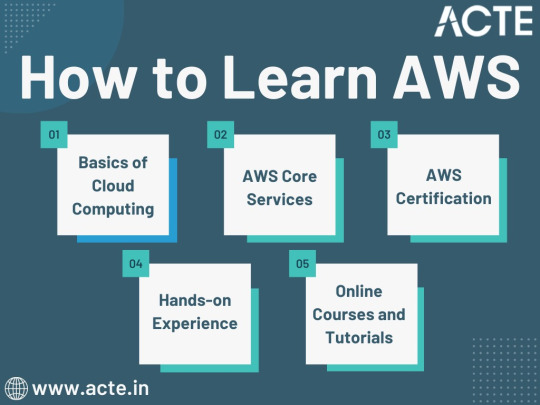
Amazon Web Services (AWS) represents an exciting frontier in the realm of cloud computing. As businesses and individuals increasingly rely on the cloud for innovation and scalability, AWS stands as a pivotal platform. The journey to AWS proficiency involves grasping fundamental cloud concepts, exploring core services, obtaining certifications, and acquiring practical experience. To expedite this process, online courses, tutorials, and structured training from renowned institutions like ACTE Technologies can be invaluable. ACTE Technologies' comprehensive AWS training programs provide hands-on experience, making your quest to master AWS more efficient and positioning you for a successful career in cloud technology.
8 notes
·
View notes
Text
Crafting a Career Odyssey: AWS Certification Unveiled for Solution Architects
Embarking on the journey of AWS certification as a Solution Architect unveils a plethora of career avenues, transforming your professional trajectory in the dynamic landscape of cloud computing. Let's explore the myriad paths that unfold for certified AWS Solution Architects:
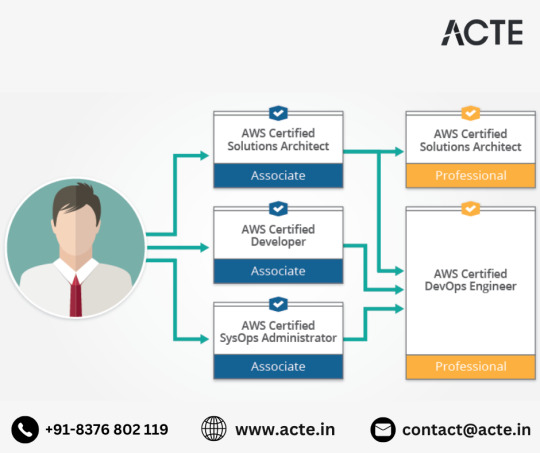
1. Architecting Excellence: Steering Digital Transformations AWS certification catapults you into roles where you architect and implement cutting-edge solutions. As a linchpin in digital transformations, you play a pivotal role in creating scalable, secure, and cost-effective solutions aligned with organizational objectives.
2. Cloud Architect Mastery: Orchestrating Comprehensive Cloud Strategies The journey doesn't stop at Solution Architect; it seamlessly transitions into broader Cloud Architect roles. Here, you orchestrate end-to-end cloud strategies, ensuring optimal performance, security, and efficiency in cloud-based environments.
3. Enterprise Architect Pinnacle: Shaping Holistic IT Strategies With AWS certification, the pathway extends to Enterprise Architect roles. This involves shaping the overarching IT strategy, aligning technology solutions with business goals, and ensuring seamless integration across the enterprise.
4. Cloud Consulting Expertise: Guiding Clients on Cloud Journey Organizations seek AWS-certified Solution Architects for Cloud Consultant positions, where you provide guidance on cloud strategies, migration plans, and optimize AWS infrastructure for enhanced performance.
5. Technical Leadership Zenith: Guiding Development Initiatives Expertise gained through AWS certification positions you favorably for technical leadership roles. Leading teams, guiding development projects, and offering strategic input on technology initiatives become part of your purview.
6. DevOps Alchemy: Bridging Development and Operations The fusion of AWS expertise and Solution Architect skills opens doors to DevOps Engineer opportunities. Your grasp of cloud infrastructure proves invaluable in optimizing continuous integration and deployment pipelines.
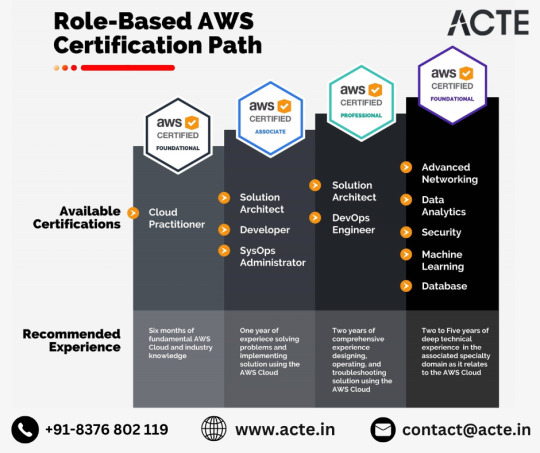
7. Pre-Sales Artistry: Crafting Compelling Solutions Leverage AWS certification in Pre-Sales Solutions Architect positions. Engaging with clients during the pre-sales phase, you become instrumental in understanding their needs and crafting compelling solutions.
8. Specialized Architectural Prowess: Exploring Niche Opportunities As technology evolves, specialized Solution Architect roles emerge. Depending on your interests and the evolving AWS service landscape, opportunities in areas like AI/ML architecture, IoT solutions, or serverless architectures beckon.
9. Entrepreneurial Odyssey: Beyond Conventional Paths Armed with AWS certification, entrepreneurial pursuits become viable. Whether offering specialized AWS services or launching a tech startup, the certification serves as a foundation for innovative endeavors.
10. Lifelong Learning Odyssey: Staying Ahead in the Dynamic AWS Realm The AWS ecosystem is dynamic, with constant updates and new services. Your certification journey becomes a springboard for continuous learning and professional development, ensuring you remain at the forefront of cloud technology.
In conclusion, AWS certification for Solution Architects is not just a validation; it's a compass guiding you through a rich tapestry of career possibilities. Whether crafting digital landscapes, steering enterprises through the cloud, or exploring niche opportunities, the certification becomes a catalyst for continuous growth, learning, and innovation in the ever-evolving cloud computing domain.
2 notes
·
View notes
Text
Navigating the Future as Azure Certifications in 2024
In the ever-evolving landscape of cloud technology, Azure certifications continue to be instrumental in shaping the careers of IT professionals and influencing the strategies of organizations worldwide. As we step into 2024, it's essential to explore the current trends, advancements, and the transformative impact that Azure certifications are poised to have in the coming year.
The Continued Relevance of Azure Certifications
Azure certifications are not mere credentials; they are gateways to expertise and recognition in the dynamic world of cloud computing. As businesses increasingly rely on cloud solutions, the demand for skilled Azure professionals continues to grow. In 2024, Azure certifications stand as key assets, ensuring that professionals possess the knowledge and skills needed to navigate the complexities of cloud technology effectively.
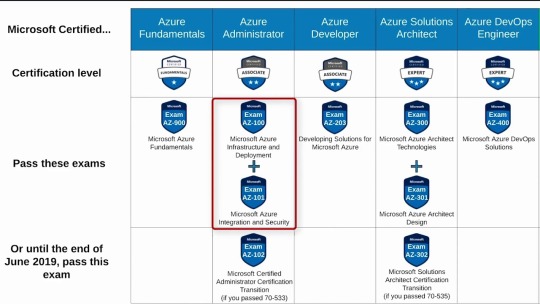
Azure Certification Paths in 2024
Azure certifications are structured into comprehensive paths, catering to individuals at various stages of their cloud journey. From foundational certifications for beginners to advanced tracks tailored for specialized roles like Azure Solutions Architect or Azure DevOps Engineer, the certification paths have evolved to align with the diverse needs of IT professionals. The year 2024 sees an increased focus on role-based certifications, allowing individuals to hone specific skills relevant to their job roles.
Key Benefits of Azure Certifications in 2024
Career Advancement:
Azure certifications are a proven catalyst for career growth. In 2024, as businesses seek skilled professionals, holding an Azure certification becomes a valuable asset for those aiming to advance their careers in cloud technology.
Industry Recognition:
Globally recognized, Azure certifications validate one's expertise in Microsoft's cloud services. Employers across industries acknowledge and value these certifications as a mark of proficiency in handling Azure-based solutions.
Continuous Learning Culture:
In 2024, Azure certifications are not just about achieving a one-time qualification; they embody a commitment to continuous learning. Microsoft regularly updates its certification paths to align with emerging technologies, encouraging professionals to stay abreast of the latest industry trends.
Increased Employability:
As the job market becomes more competitive, possessing Azure certifications enhances employability. In 2024, businesses are actively seeking candidates with practical Azure skills, making certification holders highly sought after.
Emerging Trends in Azure Certifications for 2024
Micro-Certifications:
2024 witnesses a rise in micro-certifications, focusing on specific, targeted skills. These bite-sized certifications allow professionals to demonstrate expertise in niche areas, providing a more granular approach to skill validation.
Scenario-Based Assessments:
Azure certification exams in 2024 are increasingly incorporating scenario-based questions. This shift aims to evaluate not just theoretical knowledge but the ability to apply that knowledge in practical, real-world situations.
Integration of AI and ML:
With the growing importance of artificial intelligence (AI) and machine learning (ML), Azure certifications in 2024 are placing a greater emphasis on these technologies. Certification tracks dedicated to AI and ML applications within Azure are gaining prominence.
Focus on Security:
In response to the heightened concern for cybersecurity, Azure certifications in 2024 place a significant focus on security-related tracks. Azure Security Engineer certifications are expected to be in high demand as organizations prioritize securing their cloud environments.
Tips for Success in Azure Certifications 2024
Stay Updated: Given the evolving nature of technology, staying updated with the latest Azure services and features is crucial. Regularly check Microsoft's official documentation and announcements for any updates.
Hands-On Experience: Practical experience is invaluable. Utilize Azure's sandbox environments, participate in real-world projects, and engage with the Azure portal to reinforce your theoretical knowledge.
Leverage Learning Resources: Microsoft provides a wealth of learning resources, including online courses, documentation, and practice exams. Take advantage of these resources to supplement your preparation.
Join the Azure Community: Engage with the Azure community through forums, webinars, and social media. Networking with professionals in the field can provide insights, tips, and support during your certification journey.
Conclusion
As we venture into 2024, Azure certifications stand as pivotal tools for IT professionals aiming to thrive in the dynamic world of cloud technology. Whether you are starting your journey with foundational certifications or advancing your skills with specialized tracks, Azure certifications in 2024 represent more than just qualifications – they symbolize a commitment to excellence, continuous learning, and a future shaped by innovation in the cloud. Embrace the opportunities, stay ahead of the curve, and let Azure certifications be your guide to success in the ever-evolving realm of cloud proficiency.

Frequently Asked Questions (FAQs)
What are the new Azure certifications introduced in 2024?
As of 2024, Microsoft has introduced several new certifications to align with emerging technologies. Notable additions include specialized tracks focusing on AI, ML, and advanced security.
How has the exam format changed for 2024?
The exam format in 2024 has evolved to include more scenario-based questions. This change is aimed at assessing practical application skills in addition to theoretical knowledge.
Are there any prerequisites for Azure certifications in 2024?
Prerequisites vary based on the specific certification. While some foundational certifications may have no prerequisites, advanced certifications often require prior experience or the completion of specific lower-level certifications.
Can I still take exams for older Azure certifications in 2024?
Microsoft often provides a transition period for older certifications, allowing candidates to complete them even as new certifications are introduced. However, it's advisable to check Microsoft's official documentation for specific details.
How frequently are Azure certifications updated?
Azure certifications are regularly updated to stay aligned with the latest technologies and industry trends. Microsoft recommends that candidates stay informed about updates through official communication channels.
4 notes
·
View notes
Text
AWS Courses in Chennai: Build Your Cloud Career with Trendnologies
In today’s fast-paced digital world, cloud computing is no longer optional — it’s essential. And when it comes to cloud platforms, Amazon Web Services (AWS) leads the industry. If you’re based in Chennai and looking to start or advance your IT career, enrolling in AWS courses in Chennai can be your smartest move.

At Trendnologies, we offer industry-aligned AWS training programs that combine hands-on experience, expert guidance, and 100% job placement support. Whether you are a beginner or a working professional, our AWS courses in Chennai are designed to match your learning needs and career goals.
🚀 Why Learn AWS?
AWS is the world’s leading cloud services provider, trusted by startups, government agencies, and enterprises alike. With its global reach and vast service portfolio — including compute, storage, networking, databases, machine learning, and DevOps — AWS powers a large portion of the internet.
Companies across Chennai and beyond are actively hiring AWS-certified professionals for roles like:
Cloud Engineer
AWS Solution Architect
DevOps Engineer
Cloud Security Analyst
Site Reliability Engineer (SRE)
By enrolling in AWS courses, you gain an edge in job interviews, hands-on skills, and credentials that stand out on your resume.
🎯 What Makes Trendnologies the Best for AWS Training?
At Trendnologies, we go beyond textbooks and theory. Our curriculum is based on real-time AWS projects, use cases, and industry expectations. We ensure every student is job-ready with technical expertise and career support.
Here’s what you get when you choose Trendnologies:
✅ Certified Trainers with 10+ Years of Experience ✅ Real-Time Projects and Lab Access ✅ Updated Curriculum Based on AWS Certifications ✅ Resume Preparation and Mock Interviews ✅ Dedicated Career Counsellors ✅ Flexible Batch Timings (Weekday/Weekend/Online) ✅ 100% Job Placement Guarantee
We also offer free career guidance sessions before enrollment so that you can choose the right AWS learning path.
💡 What You Will Learn in Our AWS Courses
Our AWS course content covers both fundamental and advanced topics. Whether you’re preparing for a job or for certifications like AWS Solution Architect Associate, our modules are aligned with the latest industry trends.
Course modules include:
Introduction to Cloud Computing & AWS
EC2, S3, IAM, VPC, CloudWatch
Load Balancing & Auto Scaling
Lambda & Serverless Architecture
RDS, DynamoDB & Database Services
AWS CLI, SDK, and CloudFormation
CI/CD with AWS DevOps Tools
Exam Preparation for AWS Certifications
Plus, you’ll get to build mini projects and capstone projects that simulate real-world cloud infrastructure design and deployment.
🌆 Why Chennai Is a Great Place to Learn AWS
Chennai is home to a booming tech industry, with major IT parks in OMR, Guindy, Porur, Anna Nagar, and Medavakkam. Our AWS training centers are located at accessible spots across Chennai, and we also offer online AWS classes for students from Coimbatore, Bangalore, and beyond.
This makes Trendnologies a perfect fit for anyone looking for flexibility and expert mentorship in AWS training.
👨🎓 Who Can Join?
Our AWS courses in Chennai are ideal for:
Freshers & Engineering Graduates
IT Professionals looking to upskill
System Admins and Network Engineers
DevOps Engineers & Developers
Project Managers in tech
Even if you're from a non-technical background, our trainers will help you get comfortable with cloud basics before diving into advanced concepts.
📅 Start Your Cloud Career with Us
At Trendnologies, we don’t just teach. We mentor, guide, and place you in the right career path.
📍 Join our AWS courses in Chennai – admissions open for June & July 2025 💬 Speak to our counselors to learn about course fees, certification paths, and job roles 🌐 www.trendnologies.com
0 notes
Text
Kickstart Your Cloud Journey with AWS Training in Pune
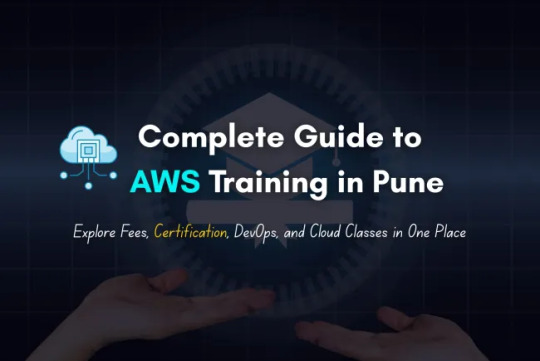
Cloud computing is reshaping the way organizations operate—and at the heart of this revolution is Amazon Web Services (AWS). If you're looking to build a future-proof career in cloud technology, enrolling in AWS Cloud Training in Pune is your first step toward success. With expert mentorship and hands-on training, WebAsha Technologies helps you gain the skills needed to thrive in today’s cloud-driven job market.
Why AWS Skills Are Essential and Beyond
Amazon Web Services (AWS) leads the cloud services industry, offering over 200 fully featured services for computing, storage, database, machine learning, and more. As cloud adoption accelerates across sectors, the demand for skilled AWS professionals continues to grow.
Top Benefits of Learning AWS:
High-paying job opportunities
Versatile roles across industries
Scalable skills for modern IT careers
Foundation for DevOps and cloud-native development
Why Choose WebAsha Technologies for AWS Training Programs in Pune?
At WebAsha Technologies, we are committed to turning learners into cloud professionals. Our AWS Cloud Training in Pune is designed for both beginners and working professionals who want to upskill or transition into cloud computing.
Key Features of Our AWS Training:
Certified and Experienced Instructors
Hands-on Practice with Real-Time Projects
Dedicated Lab Access for Cloud Experiments
Updated Curriculum Aligned with AWS Certification Tracks
Placement Support and Career Guidance
Who Should Enroll in AWS Cloud Training?
Our AWS programs are suitable for:
Fresh Graduates aspiring to enter the IT sector
IT Professionals looking to upgrade their skills
System Admins and Network Engineers
Software Developers and DevOps Engineers
Entrepreneurs planning to deploy scalable applications
What You Will Learn in the AWS Training Program
Our training covers everything you need to become cloud-ready and certification-ready.
Course Modules Include:
Introduction to Cloud Computing & AWS Overview
EC2, S3, and EBS – AWS Compute and Storage Services
VPC, Subnetting, and Network Security
IAM – Identity and Access Management
Elastic Load Balancer & Auto Scaling
RDS, DynamoDB – Database Services
CloudFormation, CloudWatch & Billing
Serverless Computing with AWS Lambda
Practice Tests & Real-Time Case Studies
Career Outcomes After AWS Training
After completing your training with us, you'll be prepared to pursue certifications like:
AWS Certified Cloud Practitioner
AWS Certified Solutions Architect – Associate
AWS Certified Developer – Associate
AWS Certified DevOps Engineer – Professional
Conclusion: Begin Your AWS Cloud Journey with Confidence
Don’t wait for opportunities—create them by building cloud expertise. The AWS Cloud Training in Pune by WebAsha Technologies is your launchpad into one of the most in-demand fields in the world. With expert trainers, real-world projects, and career support, you’ll be fully equipped to succeed in today’s competitive tech landscape.
0 notes
Text
Master the Code: How Java, Python, and Web Development Tutoring on MentorForHire Can Supercharge Your Tech Career
In a world powered by software, coding is no longer just a niche skill—it's a core competency. Whether you're looking to break into tech, ace a coding bootcamp, land your first junior developer job, or scale your expertise as a senior engineer, personalized mentoring makes a dramatic difference. That’s where MentorForHire.com comes in—a platform that connects you with industry professionals for hands-on Java Tutoring, Python Tutoring, and Web Development Tutoring.
Here’s how specialized tutoring in these key areas can accelerate your learning journey and help you achieve your software development goals.
Why One-on-One Coding Tutoring Beats Generic Online Courses
Self-paced tutorials and free courses are great for dipping your toes in—but when you're serious about growth, they often fall short. Why?
You don’t know what you don’t know.
Debugging can become a time-wasting nightmare.
Without accountability, progress slows down.
You’re not getting job-ready feedback from a real developer.
MentorForHire solves all of these problems by connecting you with real mentors who’ve worked in tech and know what it takes to succeed. Whether you're working on a class assignment, preparing for interviews, or building a full-stack project, you'll get tailored support.
Java Tutoring: Build Enterprise-Grade Skills from the Ground Up
Java isn’t just for beginners—it powers billions of devices, from Android apps to massive backend systems used in finance, healthcare, and e-commerce. If you're serious about software engineering, Java Tutoring offers a rock-solid foundation.
With a mentor, you can:
Understand core concepts like classes, inheritance, interfaces, and exception handling.
Master data structures and algorithms for whiteboard interviews.
Build scalable applications using Java frameworks like Spring and Hibernate.
Get help with unit testing, debugging, and version control.
Prepare for certifications like Oracle Certified Associate (OCA) and Oracle Certified Professional (OCP).
A mentor will not only explain the "how" of Java development but also the "why"—turning you from a coder into a software architect-in-training.
Python Tutoring: The Most Versatile Language in Tech
Python has become the go-to language for beginners and professionals alike because of its simplicity and power. Whether you want to get into automation, data science, machine learning, or back-end web development, Python Tutoring gives you the skills you need to thrive.
On MentorForHire.com, Python mentors can help you:
Write clean, efficient, and maintainable code.
Understand essential concepts like functions, loops, list comprehensions, and file I/O.
Use libraries like NumPy, pandas, Matplotlib, and scikit-learn for data analysis.
Build web apps with Flask or Django from scratch.
Automate tasks using Python scripts or integrate with APIs.
Whether you're solving LeetCode challenges or working on a startup prototype, personalized tutoring can take your Python skills to the next level.
Web Development Tutoring: Learn to Build the Web, Not Just Consume It
Today’s digital economy is built on the web—and web developers are in high demand across every industry. But with so many tools and frameworks, it’s easy to get overwhelmed. That’s where Web Development Tutoring comes in.
From front-end to back-end to full-stack, tutors on MentorForHire.com can guide you step-by-step:
Front-End Skills:
HTML, CSS, and JavaScript fundamentals
Responsive design using Flexbox and Grid
JavaScript frameworks like React, Angular, or Vue
Version control with Git and GitHub
Back-End Skills:
Node.js with Express or Java with Spring Boot
REST APIs and database integration (MySQL, MongoDB)
Authentication systems (OAuth, JWT)
DevOps basics: deploying apps with Heroku or AWS
You’ll work on actual projects like to-do lists, dashboards, or e-commerce stores—and get expert feedback every step of the way.
How MentorForHire Makes Learning Easier and Smarter
MentorForHire.com isn't just about hiring a tutor—it's about mentorship. The platform matches you with experienced developers who offer:
Flexible scheduling – Learn when it suits your life.
Customized roadmaps – No more cookie-cutter syllabi.
Real-world projects – Build apps that solve actual problems.
Code reviews & interview prep – Gain confidence before job applications.
Ongoing support – Whether it’s bugs, burnout, or breakthroughs.
This isn’t a YouTube tutorial or a lecture—it’s a partnership. Whether you're 16 or 60, learning to code becomes faster and more meaningful when you have someone guiding you in real time.
Who Is This For?
Students who want to stand out in their CS classes
Career changers entering tech from another field
Bootcamp grads who need more 1:1 help
Junior developers looking to climb the ladder
Entrepreneurs building their own software products
If you’ve got a goal and a laptop, MentorForHire.com has a mentor ready to help you reach it.
Final Thoughts: The Future Belongs to Lifelong Learners
The best investment you can make is in yourself. Whether you're learning Java, diving into Python, or building full-stack web apps, tutoring turns passive learning into active progress.
MentorForHire.com helps unlock your potential by giving you access to mentors who’ve been where you are—and know how to help you level up.
So why wait? Start your personalized tutoring journey today. Visit MentorForHire and connect with a mentor who can help you write your success story in code.
0 notes
Text
Master Multicluster Kubernetes with DO480: Red Hat OpenShift Platform Plus Training
In today’s enterprise landscape, managing multiple Kubernetes clusters across hybrid or multi-cloud environments is no longer optional — it’s essential. Whether you’re scaling applications globally, ensuring high availability, or meeting regulatory compliance, multicluster management is the key to consistent, secure, and efficient operations.
That’s where Red Hat OpenShift Platform Plus and the DO480 course come in.
🔍 What is DO480?
DO480: Multicluster Management with Red Hat OpenShift Platform Plus is an advanced, hands-on course designed for platform engineers, cluster admins, and DevOps teams. It teaches how to manage and secure Kubernetes clusters at scale using Red Hat’s enterprise-grade tools like:
Red Hat Advanced Cluster Management (ACM) for Kubernetes
Red Hat Advanced Cluster Security (ACS) for Kubernetes
OpenShift GitOps and Pipelines
Multi-cluster observability
📌 Why Should You Learn DO480?
As enterprises adopt hybrid and multi-cloud strategies, the complexity of managing Kubernetes clusters increases. DO480 equips you with the skills to:
✅ Deploy, govern, and automate multiple clusters ✅ Apply security policies consistently across all clusters ✅ Gain centralized visibility into workloads, security posture, and compliance ✅ Use GitOps workflows to streamline multicluster deployments ✅ Automate Day-2 operations like backup, disaster recovery, and patch management
👨💻 What Will You Learn?
The DO480 course covers key topics, including:
Installing and configuring Red Hat ACM
Creating and managing cluster sets, placement rules, and application lifecycle
Using OpenShift GitOps for declarative deployment
Integrating ACS for runtime and build-time security
Enforcing policies and handling compliance at scale
All these are practiced through hands-on labs in a real-world environment.
🎯 Who Should Attend?
This course is ideal for:
Platform engineers managing multiple clusters
DevOps professionals building GitOps-based automation
Security teams enforcing policies across cloud-native environments
Anyone aiming to become a Red Hat Certified Specialist in Multicluster Management
🔒 Certification Path
Completing DO480 helps prepare you for the Red Hat Certified Specialist in Multicluster Management exam — a valuable addition to your Red Hat Certified Architect (RHCA) journey.
🚀 Ready to Master Multicluster Kubernetes? Enroll in DO480 – Multicluster Management with Red Hat OpenShift Platform Plus and gain the skills needed to control, secure, and scale your OpenShift environment like a pro.
🔗 Talk to HawkStack today to schedule your corporate or individual training. 🌐 www.hawkstack.com
0 notes
Text
cloud computing chennai
Cloud Computing Training Course with Placement – Kickstart Your Career in the Cloud
Cloud computing is revolutionizing the IT industry, creating massive demand for skilled professionals in platforms like AWS, Azure, and Google Cloud. Whether you're a fresher or a working professional, enrolling in a cloud computing training course with placement support is your gateway to a future-ready tech career.
This course covers essential cloud concepts, virtualization, cloud security, DevOps, and hands-on projects. You’ll gain practical skills with real-time labs and exposure to industry-standard tools. Most importantly, you get 100% placement support through resume building, mock interviews, and direct job referrals.
Top training centers provide free career guidance, paid internships, and certification support to help you land roles such as Cloud Engineer, DevOps Engineer, or Cloud Architect. With average salaries ranging from ₹4.5 to ₹12 LPA, the career growth is exponential.
If you're looking to enter the booming tech world with expert training and guaranteed job support, a cloud computing course with placement is your perfect first step.
0 notes
Text
Embarking on a Digital Journey: Your Guide to Learning Coding
In today's fast-paced and ever-evolving technology landscape, DevOps has emerged as a crucial and transformative field that bridges the gap between software development and IT operations. The term "DevOps" is a portmanteau of "Development" and "Operations," emphasizing the importance of collaboration, automation, and efficiency in the software delivery process. DevOps practices have gained widespread adoption across industries, revolutionizing the way organizations develop, deploy, and maintain software. This paradigm shift has led to a surging demand for skilled DevOps professionals who can navigate the complex and multifaceted DevOps landscape.

Exploring DevOps Job Opportunities
DevOps has given rise to a spectrum of job opportunities, each with its unique focus and responsibilities. Let's delve into some of the key DevOps roles that are in high demand:
1. DevOps Engineer
At the heart of DevOps lies the DevOps engineer, responsible for automating and streamlining IT operations and processes. DevOps engineers are the architects of efficient software delivery pipelines, collaborating closely with development and IT teams. Their mission is to accelerate the software delivery process while ensuring the reliability and stability of systems.
2. Site Reliability Engineer (SRE)
Site Reliability Engineers, or SREs, are a subset of DevOps engineers who specialize in maintaining large-scale, highly reliable software systems. They focus on critical aspects such as availability, latency, performance, efficiency, change management, monitoring, emergency response, and capacity planning. SREs play a pivotal role in ensuring that applications and services remain dependable and performant.
3. Automation Architect
Automation is a cornerstone of DevOps, and automation architects are experts in this domain. These professionals design and implement automation solutions that optimize software development and delivery processes. By automating repetitive and manual tasks, they enhance efficiency and reduce the risk of human error.
4. Continuous Integration/Continuous Deployment (CI/CD) Engineer
CI/CD engineers specialize in creating, maintaining, and optimizing CI/CD pipelines. The CI/CD pipeline is the backbone of DevOps, enabling the automated building, testing, and deployment of code. CI/CD engineers ensure that the pipeline operates seamlessly, enabling rapid and reliable software delivery.
5. Containerization Specialist
The rise of containerization technologies like Docker and orchestration tools such as Kubernetes has revolutionized software deployment. Containerization specialists focus on managing and scaling containerized applications, making them an integral part of DevOps teams.
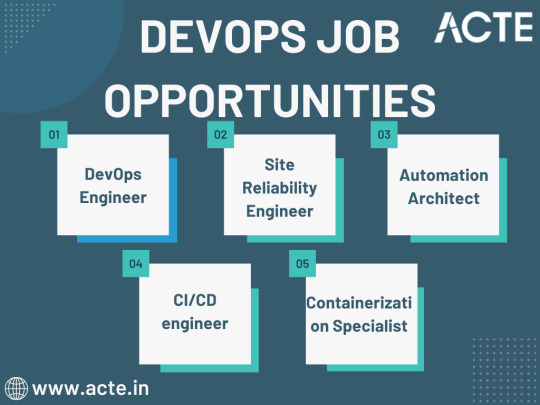
Navigating the DevOps Learning Journey
To embark on a successful DevOps career, individuals often turn to comprehensive training programs and courses that equip them with the necessary skills and knowledge. The DevOps learning journey typically involves the following courses:
1. DevOps Foundation
A foundational DevOps course covers the basics of DevOps practices, principles, and tools. It serves as an excellent starting point for beginners, providing a solid understanding of the DevOps mindset and practices.
2. DevOps Certification
Advanced certification courses are designed for those who wish to delve deeper into DevOps methodologies, CI/CD pipelines, and various tools like Jenkins, Ansible, and Terraform. These certifications validate your expertise and enhance your job prospects.
3. Docker and Kubernetes Training
Containerization and container orchestration are two essential skills in the DevOps toolkit. Courses focused on Docker and Kubernetes provide in-depth knowledge of these technologies, enabling professionals to effectively manage containerized applications.
4. AWS or Azure DevOps Training
Specialized DevOps courses tailored to cloud platforms like AWS or Azure are essential for those working in a cloud-centric environment. These courses teach how to leverage cloud services in a DevOps context, further streamlining software development and deployment.
5. Advanced DevOps Courses
For those looking to specialize in specific areas, advanced DevOps courses cover topics like DevOps security, DevOps practices for mobile app development, and more. These courses cater to professionals who seek to expand their expertise in specific domains.
As the DevOps landscape continues to evolve, the need for high-quality training and education becomes increasingly critical. This is where ACTE Technologies steps into the spotlight as a reputable choice for comprehensive DevOps training.
They offer carefully thought-out courses that are intended to impart both foundational information and real-world, practical experience. Under the direction of knowledgeable educators, students can quickly advance on their path to become skilled DevOps engineers. They provide practical insights into industrial practises and issues, going beyond theory.
Your journey toward mastering DevOps practices and pursuing a successful career begins here. In the digital realm, where possibilities are limitless and innovation knows no bounds, ACTE Technologies serves as a gateway to a thriving DevOps career. With a diverse array of courses and expert instruction, you'll find the resources you need to thrive in this ever-evolving domain.
3 notes
·
View notes
Text
Charting Career Ascent: Navigating the Dynamic Realms of AWS Cloud Expertise
Embarking on a professional journey in Amazon Web Services (AWS) cloud computing unveils a realm where innovation, adaptability, and continual growth intersect. Let's unravel the layers that make an AWS career not just promising but a vibrant tapestry of learning and opportunity.

1. Surging Demand in the Digital Frontier:
The professional landscape is witnessing an escalating demand for skilled AWS practitioners. With businesses globally embracing cloud technologies, there is an unprecedented need for individuals proficient in crafting, implementing, and overseeing cloud infrastructures.
2. Roles Tailored to Individual Expertise:
AWS distinguishes itself by offering a diverse array of roles that cater to a wide spectrum of skills. Whether one's passion lies in architecting cloud solutions, fortifying security measures, delving into development, embracing DevOps methodologies, unraveling the intricacies of data analytics, or exploring machine learning, AWS provides roles that resonate with individual expertise and career aspirations.
3. Cultivating a Culture of Continuous Learning:
Central to AWS is a commitment to innovation that fosters a culture of continuous learning. The platform's regular introduction of novel services and features not only encourages but necessitates staying abreast of the latest technologies for success in the ever-evolving field of cloud computing.
4. Global Career Horizons:
AWS's prominence as a global cloud services leader opens up expansive career opportunities. Working with international teams, contributing to projects with a global impact, and having the flexibility to explore diverse career options across geographical locations are intrinsic benefits of an AWS career.
5. Competitive Compensation and Professional Advancement:
The demand for AWS professionals, coupled with certifications and expertise, translates into competitive remuneration. Beyond monetary rewards, AWS offers a trajectory for continual professional growth as individuals accumulate experience and certifications within the dynamic realm of cloud computing.
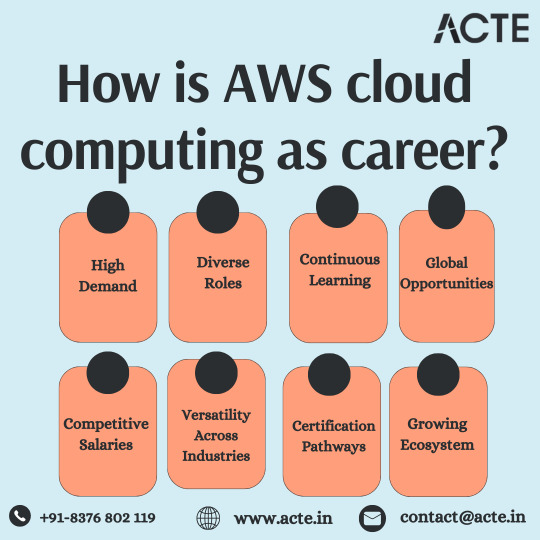
6. Versatility Across Industries:
AWS's adaptability spans across a myriad of industries including finance, healthcare, e-commerce, and entertainment. This versatility empowers professionals to align their careers with industries of personal interest, contributing to impactful projects in diverse sectors.
7. Certification Validation and Professional Credibility:
AWS's robust certification program provides a structured framework for professionals to validate their expertise. Earning AWS certifications not only enhances credibility in the job market but serves as tangible evidence of proficiency in specific AWS services and roles.
8. A Flourishing Ecosystem and Community Synergy:
Being an integral part of the AWS ecosystem brings manifold advantages. Access to a vast network of partners, clients, and a thriving community provides invaluable opportunities for networking, collaboration, and a continual awareness of industry trends.
9. Flexibility with Remote Work:
The inherent nature of cloud computing often facilitates remote work opportunities. This flexibility in work arrangements is particularly appealing to those seeking a harmonious work-life balance or exploring career possibilities beyond the confines of their immediate physical location.
10. Future-Proofing Careers with AWS Prowess:
The ongoing paradigm shift of businesses to the cloud positions an AWS career as potentially future-proof. As skills in AWS cloud computing become increasingly indispensable, professionals find themselves at the forefront of technology trends, ensuring continued relevance in the dynamic field of cloud computing.
In conclusion, stepping into an AWS cloud computing career promises not just a job but an immersive journey into a realm where each stride unfolds new discoveries and opportunities for professional excellence. The dynamic and ever-evolving nature of AWS makes it a prime choice for those aiming to carve a successful and fulfilling career path in the technology industry.
2 notes
·
View notes
Text
Fuel Your Coding Journey with Full Stack Development Mastery
In today’s fast-paced digital world, technology is evolving rapidly—and so are the demands for skilled developers who can build, optimize, and maintain both the front-end and back-end of web applications. This is where full stack development enters the spotlight. If you’re aspiring to become a well-rounded developer, it’s time to fuel your coding journey with full stack development mastery.
Mastering full stack development opens doors to a variety of career paths in software engineering, product development, and tech entrepreneurship. Whether you're a beginner or an experienced programmer, choosing the right training institute plays a crucial role in shaping your future.
What is Full Stack Development?
Full stack development refers to the ability to work on both the client-side (frontend) and server-side (backend) of web applications. A full stack developer is a versatile professional capable of building complete, functional, and scalable digital products.
The core components of full stack development include:
Frontend Technologies: HTML, CSS, JavaScript, React, Angular
Backend Technologies: Java, Node.js, Python, PHP
Databases: MySQL, MongoDB, PostgreSQL
Version Control Systems: Git, GitHub
Deployment & DevOps: Docker, Jenkins, AWS
A comprehensive understanding of these technologies allows developers to create seamless and user-friendly applications from start to finish.
Why Choose Full Stack as a Career?
The demand for full stack developers continues to grow as companies seek professionals who can manage complete project lifecycles. Here are some compelling reasons to fuel your coding journey with full stack development mastery:
Versatility: Ability to work on multiple layers of technology.
High Demand: Recruiters prefer candidates who can take ownership of both backend and frontend tasks.
Lucrative Salaries: Skilled full stack developers command competitive compensation.
Entrepreneurial Edge: Perfect skillset for launching tech startups or freelance projects.
Job Security: Wide range of industries need full stack expertise, from fintech to healthcare.
How to Start Your Full Stack Development Journey?
The first step is choosing the best full stack development training institute in Pune or your local area. Pune, being a rising IT hub, is home to several reputed institutes offering hands-on training with real-world projects.
A quality training institute should offer:
Practical Learning: Focus on live projects and real-time development.
Experienced Faculty: Mentors with real industry experience.
Career Support: Resume building, interview prep, and placement assistance.
Certifications: Industry-recognized credentials that enhance your profile.
Why Java is Still Relevant in Full Stack?
Even though newer technologies are emerging, Java continues to be a cornerstone in enterprise-level development. It is stable, secure, and widely used in backend systems.
If you’re starting from scratch or looking to strengthen your backend development skills, enrolling in a Java training institute in Pune can be a great foundation. Java-based frameworks like Spring Boot and Hibernate are still highly in demand in full stack job roles.
Benefits of Learning Java for Full Stack Development:
Robust and platform-independent.
Easy integration with front-end frameworks.
Strong community support and libraries.
Powerful tools for backend development.
What Makes Pune a Learning Hotspot?
Pune has emerged as a favorite destination for aspiring developers due to its balance of affordable education and booming tech industry. With the presence of numerous MNCs and startups, Pune provides a dynamic environment for learners.
When looking for the best full stack development training institute in Pune, make sure the institute provides:
Updated curriculum aligned with industry needs.
Mentorship from software architects and engineers.
Job placement records and success stories.
Internship opportunities with local IT firms.
Features to Look for in a Full Stack Course
Before enrolling, ensure the course offers:
Complete Stack Coverage: HTML5, CSS3, Bootstrap, JavaScript, React, Node.js, Express.js, MongoDB/MySQL, Git.
Project-Based Learning: Build projects like e-commerce platforms, dashboards, or portfolio websites.
Interactive Classes: Regular assessments, code reviews, and Q&A sessions.
Capstone Projects: Opportunity to showcase your skills through a final project.
Kickstart Your Journey Today
Whether you’re passionate about building web apps or aiming for a career switch, full stack development is the ideal launchpad. It equips you with everything you need to stand out in today’s competitive job market.
Remember, the right mentorship can make all the difference. Seek out a Java training institute in Pune that also offers full stack development programs. Or better, opt for the best full stack development training institute in Pune that gives you exposure to multiple technologies, industry insights, and placement opportunities.
Final Thoughts
It’s not just about learning to code; it’s about transforming the way you think and create digital solutions. When you fuel your coding journey with full stack development mastery, you equip yourself with tools and knowledge that go beyond theory.
Take the leap. Choose the right course. Surround yourself with the right mentors. And soon, you’ll not just be coding—you’ll be building, innovating, and leading the digital future.
0 notes
Text
Boost Your Cloud Career with an AWS Course in Pune
As cloud computing continues to revolutionize how businesses operate, Amazon Web Services (AWS) remains at the forefront of this transformation. Whether you're a student, IT professional, or someone looking to shift careers, enrolling in an AWS course in Pune can provide you with the essential skills to succeed in today’s tech industry.
Why Choose Pune for AWS Training?
Pune has emerged as one of India’s leading IT and education hubs, attracting numerous tech companies and skilled professionals. The city boasts a vibrant tech ecosystem with a strong demand for cloud computing experts. Taking an AWS course in Pune gives learners access to top training institutes, expert instructors, and hands-on learning environments.
Moreover, Pune’s affordability and quality of life make it a preferred destination for students and working professionals alike.
What You Learn in an AWS Course
An AWS course in Pune typically covers all major aspects of Amazon Web Services, preparing you for industry certifications and real-world implementation. Core topics include:
Cloud Fundamentals: Understanding the basics of cloud computing and AWS architecture.
Compute and Storage Services: Using EC2, S3, EBS, and other critical services.
Networking & Security: Managing VPCs, IAM roles, and encryption protocols.
DevOps Tools: Automating cloud operations using AWS CLI, CloudFormation, and Elastic Beanstalk.
Databases and Serverless: Working with RDS, DynamoDB, Lambda, and more.
Many courses also include lab sessions, live projects, and preparation for AWS certification exams like AWS Certified Solutions Architect or AWS Certified Developer.
Who Can Enroll in the Course?
An AWS course in Pune is suitable for a wide range of individuals—fresh graduates, software developers, system administrators, DevOps engineers, and even project managers. You don't need advanced programming skills to begin; a basic understanding of IT concepts is usually sufficient.
The flexibility of course formats—weekend batches, online training, and fast-track options—makes it easier for working professionals to learn without interrupting their current jobs.
Career Opportunities After the Course
The demand for cloud professionals is growing rapidly across sectors like IT, banking, healthcare, e-commerce, and telecom. After completing an AWS course in Pune, you can pursue roles such as:
Cloud Engineer
AWS Developer
Solutions Architect
DevOps Engineer
Cloud Consultant
Having AWS skills on your resume greatly improves your job prospects and earning potential. Pune, with its expanding tech landscape, offers plenty of job openings for AWS-certified professionals.
Conclusion
An AWS course in Pune https://www.apponix.com/AWS-Essentials-Solutions-Architect/AWS-training-in-Pune.html is more than just a certification—it's a gateway to a high-growth, future-proof career in cloud computing. With quality training options, hands-on projects, and proximity to major IT firms, Pune is an ideal city to start your cloud journey. Whether you're looking to enhance your skills or pivot your career, now is the perfect time to invest in AWS training and embrace the cloud revolution.
0 notes
Text
Your Path to Cloud Certification Starts with AWS Training in Pune
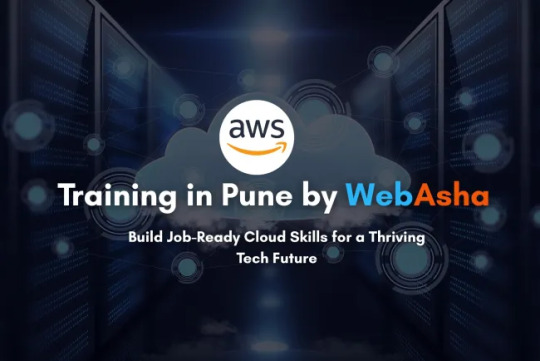
In the era of digital transformation, cloud computing is no longer a luxury—it's a necessity. Whether you’re starting your career or aiming to upgrade your technical skill set, one certification stands out among the rest: AWS. And where better to start than with expert-led AWS Training in Pune at WebAsha Technologies?
Why AWS Certification Matters in Today’s IT Landscape
Amazon Web Services (AWS) dominates the cloud market with its reliable, scalable, and flexible platform, which is used by millions of businesses worldwide. Earning an AWS certification demonstrates your ability to design, deploy, and manage cloud-based solutions—a skill set that is increasingly sought after by top employers.
Benefits of Getting AWS Certified
Gain global recognition and credibility
Unlock higher-paying job opportunities
Strengthen your foundational and advanced cloud knowledge
Become eligible for roles like Cloud Architect, DevOps Engineer, and more
Stand out in interviews with verified cloud skills
Kickstart Your Journey with AWS Training in Pune
If you're in Pune—a rapidly growing IT and tech hub—there’s no better time or place to begin your cloud learning path. With AWS Training in Pune offered by WebAsha Technologies, you’ll learn directly from industry experts and gain hands-on experience that prepares you for real-world cloud environments.
Why Choose WebAsha Technologies?
At WebAsha Technologies, we don’t just teach cloud computing—we build cloud professionals. Our training goes beyond theory, providing you with the tools and confidence to earn your certification and succeed in the workforce.
What Makes Our AWS Training Unique?
Certified and experienced trainers
Real-time projects and lab sessions
Updated course content aligned with AWS exams
Interview preparation and placement support
Flexible batch timings for working professionals and students
What You Will Learn in Our AWS Training Program
Our structured curriculum ensures you’re not just exam-ready—but job-ready.
Core Modules Include:
Introduction to Cloud Computing and AWS Ecosystem
AWS Compute Services (EC2, Lambda)
Storage Solutions (S3, EBS, Glacier)
Networking and Security (VPC, IAM)
Database Management (RDS, DynamoDB)
Monitoring and Auto-Scaling
Deployment and CI/CD with AWS Tools
Hands-on Projects and Mock Certification Tests
Who Should Enroll in AWS Training in Pune?
Whether you’re a fresher or an experienced professional, our training is tailored for:
Aspiring Cloud Engineers and Architects
IT Professionals and Developers
DevOps Practitioners
Network and System Administrators
College Students Seeking Future-Proof Careers
Take the First Step Toward AWS Certification
At WebAsha Technologies, our goal is simple—empowering you with in-demand cloud skills through the best-in-class AWS Training in Pune. By the end of this course, you’ll be ready to clear your AWS certification exams and step confidently into the world of cloud computing.
0 notes